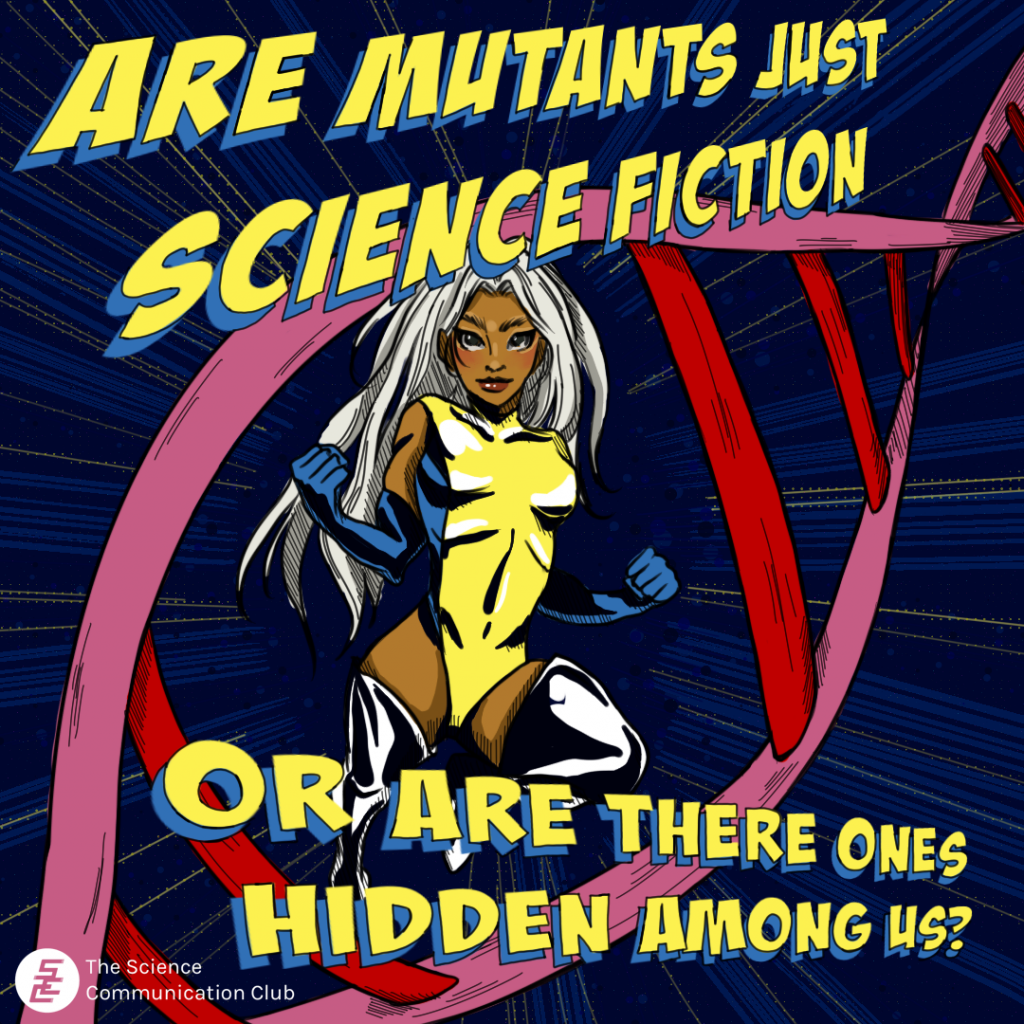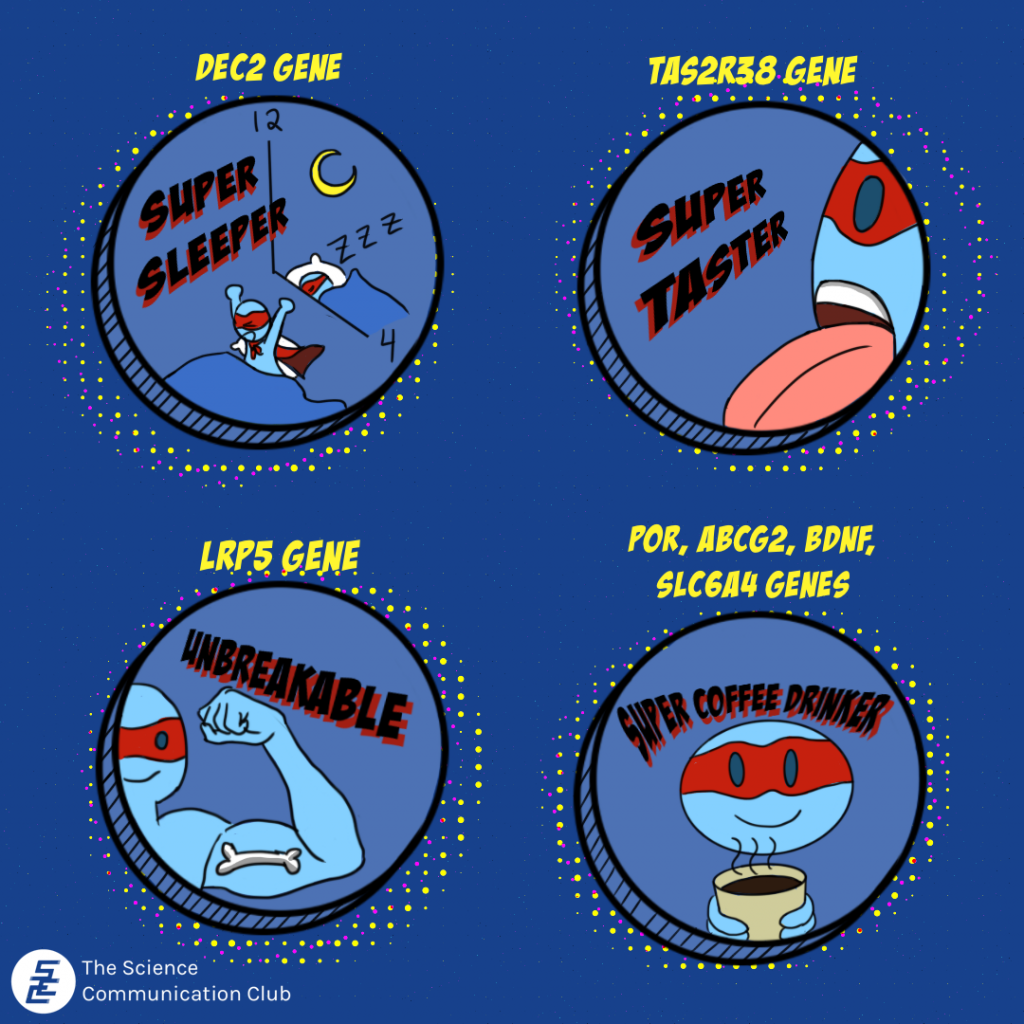
Written by Selin Eda Sagnak
Illustrated by Juliet Ko
This article is part of our Special’s Week series, The Science of Science Fiction and Popular Media.
I’ve got news for you: you are a mutant!1
Yes, you read that correctly!
Every human being is technically a mutant due to the naturally occurring mutations in our genes. And, we have been using this natural process as a spark for our creativity through science fiction. Science fiction is a genre of media in which science is used to enhance the products of our imagination. But sometimes, these ideas can seem more like fiction than science. For instance, the superpowers we see in literary universes can look utterly implausible. One such example is the X-Men universe where “mutants” gain superpowers from mutations. However, if the definition of a mutant is based on having these unique “mutations”, then technically everyone reading this article is a mutant themselves!
Your eye colour, height, and other visual features are determined by the genes present in your DNA sequence. You inherited these genes from your parents, and their sequence has been changing, or mutating, slowly over time between each generation. Mutations help create natural variation among humans, and they are the reason that not all people look identical. Although they aren’t as surprising as those in X-Men, there are people with exciting mutations among us…
The Super-Sleeper Mutation
The super-sleeper mutation was discovered by Professor Ying-Hui Fu, who is a neurologist at UC San Francisco.2 The gene impacted by this mutation is called DEC2, and it is responsible for regulating your circadian rhythm (sleep cycle).2 DEC2 controls another important gene, MyoD, which allows the body to produce orexin, a biological molecule that makes us feel awake.2 Fu discovered that some people who have this mutation in their gene are able to fall asleep around midnight and wake up very early, thus only having 4-5 hours of sleep per night!2 It’s easy to assume that these people have adjusted their sleep schedule by choice, but as Fu clarifies: “These are not people who’ve trained themselves to wake up early. They’re born this way.”2
The Supertaster Variant
The supertaster variant is a result of the gene TAS2R38.3 This gene causes people to be more sensitive to tastes, especially that of 6-n-propylthiouracil, which amplifies bitter sensations.3 This variant can also increase someone’s number of tastebuds up to 4 times the average!3 Interestingly, these people might be commonly labelled as “picky eaters” as their sensitivity to bitterness is especially present in the foods often included in this categorization.3 As an attempt to prevent their amplified perception of bitterness, they might use excess amounts of other flavours like salt when cooking!3

The Unbreakable Mutation
The unbreakable mutation was discovered in a single family by Yale professors Richard P. Lifton and Karl L. Insogna.4 The individuals from this family had high bone density, and Lifton even postulated that “these people have about the strongest bones on the entire planet”!4 On the other hand, a mutation in the gene LRP5 has been known to cause the opposite effect.4 This results in a disease called osteoporosis, which causes bones to be very weak and easily be damaged, even by small forces like coughs.5 Lifton and Insogna looked to see if LRP5 was mutated in a completely different way in the strong-boned family; if certain mutations make bones weaker, then maybe ones exist that can make bones stronger!4 The hope of their research is to use data collected from this family to create solutions for bone-related diseases like osteoporosis.4
The Super Coffee-Drinker Variants
The super coffee-drinker variants were discovered by researchers from Harvard School of Public Health and Brigham and Women’s Hospital.6 6 new variations of genes related to caffeine processing were discovered, including those involving both caffeine intake and metabolism.6 Even though the exact process of how these genes affect caffeine intake and its effect on the body isn’t described; Marilyn Cornelis, a researcher from Harvard, discussed how “[These] findings may allow us to identify subgroups of people most likely to benefit from increasing or decreasing coffee consumption for optimal health.”6
There are many more examples of superhero-like mutations that could be added to this collection. It truly makes one contemplate the wonders of the human body! Next time you watch or read science-fiction, remember that the line separating science and fiction is thinner than you may think. Although we may not see fascinating mutations like shape-shifting or telekinesis anytime soon, nature’s “mutants” are certainly worth investigation.
Sources
- X-Men: First Class Quotes. 2011 [accessed 2022 Nov 18]. https://www.imdb.com/title/tt1270798/quotes/qt1438391
- Bai N, Smith D. Scientists Discover How Gene Mutation Reduces the Need for Sleep. University of California San Francisco. 2018 Mar 16 [accessed 2022 Nov 18]. https://www.ucsf.edu/news/2018/03/410051/scientists-discover-how-gene-mutation-reduces-need-sleep
- Are You a Supertaster? healthline. 2019 Feb 21 [accessed 2022 Nov 18]. https://www.healthline.com/health/food-nutrition/supertaster
- “Unbreakable” bones prompt a hunt for genes. Yale Medicine Magazine. 2002 Autumn [accessed 2022 Nov 18]. https://medicine.yale.edu/news/yale-medicine-magazine/article/unbreakable-bones-prompt-a-hunt-for-genes/
- Osteoporosis. National Institute on Aging. [accessed 2022 Nov 18]. https://www.nia.nih.gov/health/osteoporosis
- New genetic variants associated with coffee drinking. Harvard T.H. Chan School of Public Health. 2014 Oct 7 [accessed 2022 Nov 18]. https://www.hsph.harvard.edu/news/press-releases/genetic-variants-linked-with-coffee-drinking/
Resource for the list of superpowers:
Pflanzer LR. 8 genetic mutations that can give you “superpowers.” INSIDER. 2016 Jan 9 [accessed 2022 Nov 18]. https://www.businessinsider.com/genetic-mutations-that-make-you-more-awesome-2016-1#actn3-and-the-super-sprinter-variant-1